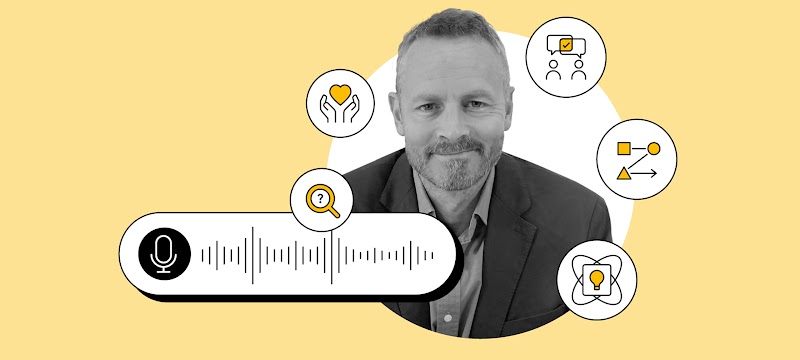
In the year ahead, software and AI will play an even bigger role in marketing. Guests on Think with Google’s Firestarters podcast have shown us the very human attributes marketers can use to stay ahead of the game. Podcast host Neil Perkin, founder of consultancy Only Dead Fish, explains.
At a time of rapidly accelerating marketing technology, it might seem counterintuitive that human skills are becoming even more important. But, while AI will continue to revolutionise the way we work, the brands that will shine in 2025 are those which remember a fundamental truth: marketing is, at its heart, about connecting with people.
This was a core theme with my guests on the Firestarters podcast series over the last year. No matter their industry background or discipline, all shared a resolute optimism about the enduring value of human ingenuity to elevate marketing in the age of AI.
Below, I’ve highlighted five essential human skills that my interviewees taught me will be crucial in the year ahead. These aren’t simply soft skills but core strengths that will set marketers apart in the months and years ahead.
1. Embrace empathy and candour to unlock relationships
Whether you’re a brand working with an agency or an agency collaborating with a brand, it’s tempting to view these relationships through a transactional lens. Truly successful partnerships require something more: empathy and candour. This involves understanding the needs and perspectives of all parties involved on a deeply human level, especially at a time when AI is automating many tasks.
Jason Oke, global client president at Dentsu, cautions against the “us vs. them” mentality within agencies. “Stop talking about yourself and just listen to your clients,” he advises. “The more you understand their lives, loves, fears, and what makes them tick, the greater the end result.”
For Robin Bonn, founder of Co:Definery, a specialist consulting and coaching practice for agency businesses, open and constructive communication is crucial. He says: “We can’t complain about not being in a meaningful partnership unless we learn to express what we mean and bring a valuable contribution to the conversation.”
This means going deeper than simply understanding a brand’s business needs. It’s about actively listening to its concerns, aspirations, and motivations, discovering the people behind the brand — and having the courage to suggest alternatives to their “less constructive” ideas.
2. Cultivate curiosity to create advertising that resonates
Just as empathy is crucial for building strong relationships, curiosity is essential for understanding your customers and creating advertising that connects.
“I remember, for a Boots campaign, going into people’s bathrooms and looking in their cupboards,” says Sophie Lewis, strategist and former chief strategy officer at M&C Saatchi. “You cannot get the level of understanding — the ‘whys’ of what they’re doing — without getting into that level of granularity.”
For Lewis, while AI developments and big data are vital for market insights, they can’t fully replicate or replace the human ability to understand the nuances of taste, the subtle cultural cues, and the emotional connections that make advertising resonate.
Her advice? Marketers need to cultivate a relentless curiosity about their audience, delving deep into the cultural forces that shape their preferences (as well as poking around their bathrooms).
3. Foster collaboration to drive innovation
While individual curiosity fuels creativity, collaboration amplifies it, sparking innovative solutions that wouldn’t be possible alone.
Business breakthroughs rarely happen in silos. The most innovative solutions and creative ideas emerge from diverse human perspectives and collaborative energy.
The problem, according to Alison Orsi, executive coach and former chief marketing officer for Europe, the Middle East, and Africa (EMEA), at IBM, is that in too many organisations, the marketing department acts alone. In truth, it needs to be the force that brings everyone together.
“Marketing is the thread that connects everything. It’s the connective tissue of a business,” she says. “To truly innovate, we need to break down silos and embrace the power of ‘we’.”
Tanya Evans, group culture and leadership director at Lloyds Banking Group, emphasises the importance of being “scientific” in bringing people together. “Cognitive diversity is so critical,” she says. “You get that by creating belonging for individuals from different backgrounds, different thinkers, and people who have different abilities and capabilities.”
While AI tends to join the dots within existing patterns, a novel mix of what Evans calls “serendipitous moments” of genuine innovation will help marketers to stay ahead.
4. Be adaptable to combat uncertainty
Uncertainty has hindered marketing innovation and dominated conversations for what feels like far too long now. But what if, instead of a threat, this uncertainty can be our greatest ally? Many of my guests on Firestarters explored this intriguing paradox, revealing how to turn uncertainty into a catalyst for growth.
As Sam Conniff, founder of Uncertainty Experts, a consultancy that helps organisations navigate change, puts it: “Uncertainty is shown to push the human mind into its almost optimum state for learning… One of the key ways you can trigger it is moments of uncertainty.”
He argues that we need to reframe our relationship with uncertainty by recognising its potential to push us beyond our comfort zones and unlock new levels of creativity and success.
Lloyds’ Tanya Evans highlights the importance of adapting to change by helping everyone affected by change discover “what’s in it for me”.
“Change is hard and quite often fear-inducing for people,” she says. “So leaders have to make it relevant for people if we’ve got any hope of bringing them with us on the journey and making it meaningful for them.”
5. Harness human ingenuity to stand out
Right now, with so much change happening, it’s understandable that people are fearful — and the proliferation of AI is as big a change as they come. But every guest I spoke to this year emphasised the enduring importance of human creativity in the age of AI.
As Gen Kobayashi, chief strategy officer for U.K. & EMEA at Weber Shandwick, aptly puts it, “Whether you’re in advertising or PR, it’s still the business of human beings.”
For futurist Adah Parris, technology is about human relationships, “with ourselves, with others, and with our environment”.
Are we using technology to genuinely improve people’s lives? Or are we simply chasing the next shiny object? The consensus among my guests: in a world saturated with digital noise, organisations and brands that put people at the centre of their strategies and prioritise genuine human connection — using AI to enhance, not replace, core marketing skills — are the ones that will stand out in 2025.



